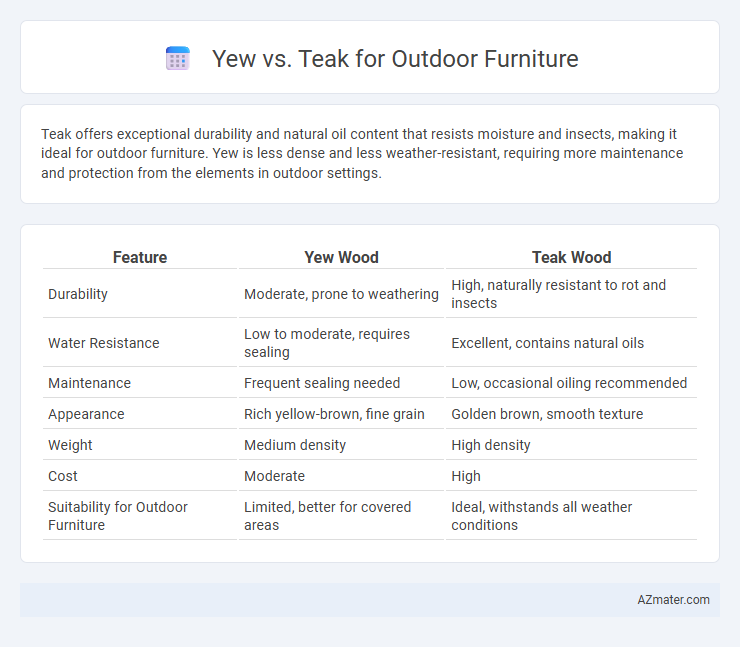Teak offers exceptional durability and natural oil content that resists moisture and insects, making it ideal for outdoor furniture. Yew is less dense and less weather-resistant, requiring more maintenance and protection from the elements in outdoor settings.
Table of Comparison
| Feature | Yew Wood | Teak Wood |
|---|---|---|
| Durability | Moderate, prone to weathering | High, naturally resistant to rot and insects |
| Water Resistance | Low to moderate, requires sealing | Excellent, contains natural oils |
| Maintenance | Frequent sealing needed | Low, occasional oiling recommended |
| Appearance | Rich yellow-brown, fine grain | Golden brown, smooth texture |
| Weight | Medium density | High density |
| Cost | Moderate | High |
| Suitability for Outdoor Furniture | Limited, better for covered areas | Ideal, withstands all weather conditions |
Introduction: Yew vs Teak for Outdoor Furniture
Yew and teak are popular choices for outdoor furniture due to their durability and natural resistance to decay. Teak wood is renowned for its high oil content, which provides exceptional weather resistance and a rich golden-brown hue that ages gracefully over time. Yew, while less oily and dense, offers a distinctive reddish tone and strong resistance to moisture, making it a viable alternative for outdoor applications in milder climates.
Key Differences Between Yew and Teak Wood
Yew wood offers a dense, fine-grained texture with natural reddish-brown hues and excellent resistance to decay, making it suitable for decorative outdoor furniture but less durable in extreme weather compared to teak. Teak wood is renowned for its high oil content, rich golden-brown color, and exceptional durability, providing superior resistance to moisture, insects, and UV rays, which ensures longevity in harsh outdoor conditions. The key differences lie in teak's superior weather resistance and maintenance ease versus yew's unique aesthetic appeal and moderate outdoor performance.
Durability and Longevity Comparison
Yew wood offers moderate durability and natural resistance to decay, making it suitable for outdoor furniture in mild climates but requiring regular maintenance to prevent weather damage. Teak wood is renowned for its exceptional durability and longevity, with natural oils providing superior resistance to rot, insects, and moisture, enabling outdoor furniture to last decades with minimal upkeep. When comparing both, teak consistently outperforms yew in resisting harsh outdoor conditions, making it the preferred choice for long-lasting and low-maintenance outdoor furniture.
Weather Resistance: Yew vs Teak Outdoors
Teak offers exceptional weather resistance due to its high natural oil content, making it highly durable against moisture, UV rays, and temperature fluctuations in outdoor furniture. Yew, while moderately weather-resistant, is more prone to cracking and decay without regular maintenance or protective treatment. Teak's resilience and lower upkeep requirements make it a superior choice for long-lasting outdoor furniture exposed to harsh environmental conditions.
Maintenance Requirements for Yew and Teak Furniture
Yew furniture demands regular sealing and protective finishes to prevent moisture damage and maintain its natural luster, especially in humid or rainy climates. Teak requires minimal maintenance due to its high natural oil content, which resists water, decay, and insect damage, allowing it to age gracefully with occasional cleaning and teak oil application. Both woods benefit from periodic inspections for cracks or wear, but teak's durability and weather resistance make it a lower-maintenance option for outdoor furniture.
Appearance and Aesthetic Appeal
Yew wood displays a rich, warm reddish-brown hue with fine grain patterns that create a classic, elegant look for outdoor furniture. Teak offers a golden to medium brown color that weathers to a distinguished silver-gray patina, enhancing its natural, rustic charm under outdoor conditions. Both woods bring unique aesthetic appeal, with Yew favoring traditional sophistication and Teak delivering timeless, weather-resistant beauty.
Environmental Impact and Sustainability
Yew wood, known for its slow growth and dense grain, offers durability but its limited availability raises concerns about overharvesting and habitat disruption. Teak, renowned for natural oil content and resistance to rot, often comes from plantations certified by FSC, promoting sustainable forestry and reducing illegal logging. Choosing FSC-certified teak or reclaimed yew wood can significantly reduce environmental impact and support sustainable outdoor furniture production.
Cost Comparison: Yew vs Teak Furniture
Yew outdoor furniture generally costs less than teak due to its relative abundance and faster growth rate, making it a budget-friendly option for quality wood furniture. Teak furniture commands a higher price because of its exceptional durability, natural oil content, and resistance to weather, which reduces maintenance costs over time. While initial investment for teak is higher, its longevity and minimal upkeep often result in a better cost-performance ratio compared to yew in long-term outdoor furniture use.
Best Uses and Applications for Each Wood
Yew wood, known for its high density and natural resistance to decay, excels in crafting intricate outdoor furniture pieces such as benches and decorative garden chairs, particularly in shaded or covered areas to prevent weathering. Teak's exceptional oil content and durability make it ideal for fully exposed outdoor furniture like patio sets and dining tables, thriving even in harsh weather conditions without the need for frequent maintenance. Both woods offer unique aesthetic qualities and functional benefits, with Yew favored for its fine grain and vibrant color in sheltered environments, while Teak provides unparalleled longevity and water resistance for open-air applications.
Final Verdict: Which is Better for Outdoor Furniture?
Yew wood offers exceptional durability and natural resistance to decay, making it a strong contender for outdoor furniture exposed to varying weather conditions. Teak, renowned for its high oil content and dense grain, provides superior resistance to moisture, insects, and UV damage, ensuring long-lasting performance with minimal maintenance. Given these factors, teak is generally considered the better choice for outdoor furniture due to its unmatched weather resistance and longevity.

Infographic: Yew vs Teak for Outdoor Furniture
 azmater.com
azmater.com